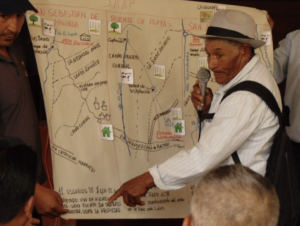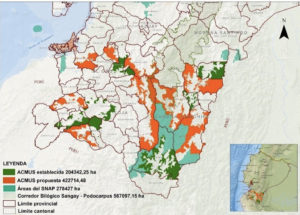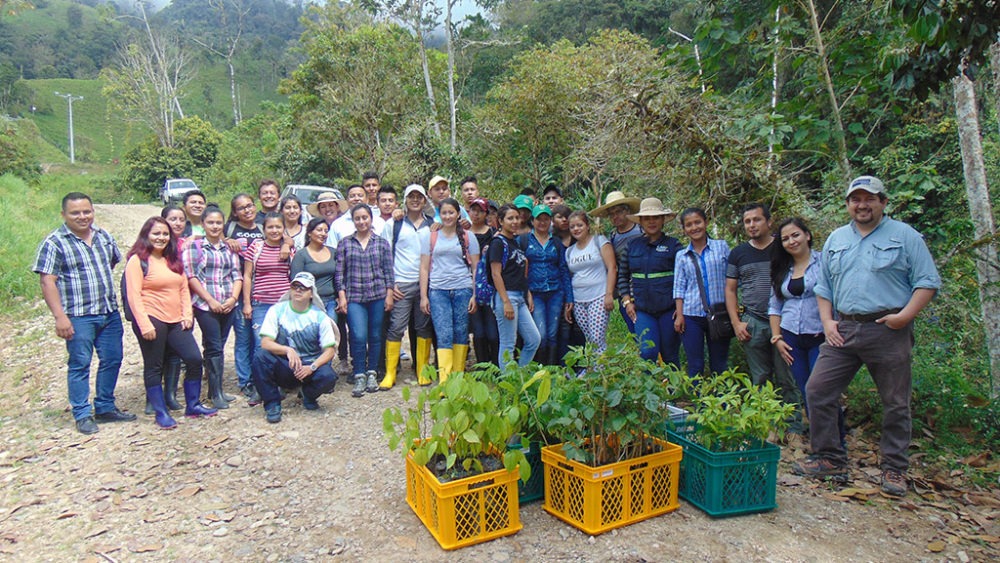The FORAGUA Regional Water Fund is a financial mechanism, a trust, which was subscribed on July 8, 2009, with a validity of 80 years. Its objective is to protect, recover and restore environmental services and biodiversity in fragile ecosystems of Region 7, the provinces of Zamora, Loja and El Oro in southern Ecuador. It comprises 14 municipal GADs and the Nature and International Culture organization.
One of FORAGUA’s main interests is to expand and establish Ordinances for protecting water sources and biodiversity with Municipal GADs. Since 2017, it has been working on these legal instruments of local governance with the support of the Ministry of Environment and Water (MAAE) and the United Nations Development Program (UNDP) under an inter-institutional agreement with PROAmazonía, which implements REDD+ actions with Green Climate Fund (GCF) resources.
These ordinances led to the establishment of Municipal Conservation and Sustainable Use Areas (ACMUS). The financing required for long-term maintenance of these areas comes from an environmental potable water fee paid by users in cantons that are members of the trust; that is, those who utilize the environmental services of properly-maintained ecosystems. The funds collected are invested, and this financial mechanism includes, among other things, a package of incentives for owners who carry out agricultural and livestock activities in water management areas (AIH).
FORAGUA and its collaborators regulate land use and occupation to conserve water sources and ensure sustainable production. It fulfills a constitutional right, article 71 of the Constitution, that was granted to nature to conserve the environment and its functionality. Funds are obtained through an annual investment plan based on municipal ordinances and the trust contract. One of these investments relates to incentives for managing or converting land use, such as property tax exemptions for farms inside the AIH.
Since FORAGUA is an irrevocable, unalterable and unattachable long-term financial mechanism, water consumption fees can be invested to generate income. This helps solve a common problem of integrated water management by ensuring the conservation of ecosystem services. Moreover, by creating, expanding, managing and monitoring reserve areas of Municipal GADs in the provinces of Loja and Zamora Chinchipe, the Fund aims to reduce Climate Change vulnerability as well as Greenhouse Gas emissions (GHG) from deforestation and degradation.
In its REDD+ implementation plan, the FORAGUA Technical Secretariat offered to establish 197,000 hectares of ACMUS and restore a thousand hectares in the AIH. These will provide analyses of Climate Change vulnerability and risk in 4 watersheds with monthly information up to 2040. Finally, the plan includes tree cover loss monitoring with early warning systems and carbon stock assessment in three ecosystems of the region.
Water sources in the FORAGUA intervention zone undergo constant degradation due to agricultural and livestock activities, and 90% of these areas are private properties. One of the main challenges for the financial mechanism is to reduce tree cover loss due to direct and indirect causes in vital natural ecosystems in order to maintain the quality and quantity of water for human consumption.
The goal of ensuring the conservation, protection, recovery and restoration of these areas of great importance to the population, requires continuous local coordination and management to establish and/or update ordinances, sign conservation agreements with farmers and promote land use change for restoration.
The transformation process begins with a survey and biophysical characterization of the farm. This information raises critical points to negotiate with the land owner to identify benefits and later reach an agreement on compensation for environmental services provided by the land, based on the opportunity cost of signing the conservation agreement (Fig. 1).
The implementation plan has been executed in the municipalities of El Pangui, Yantzaza, Centinela del Cóndor, Palanda, Celica and Macará, which expanded their conservation ordinances. By 2021, the Municipal GADs of Loja, Puyango, Calvas and Zamora will have to comply with this requirement and develop their ordinances before the effective intervention of REDD+ actions. The Implementation Plan calls for an investment of $ 2,593,237.50 by 2025, and aims to declare 422,714.48 ha. in ACMUS. PROAmazonía will finance 54% of this investment until 2022, for activities to guarantee the protection and recovery of AIHs. It has also collaborated through assessments, sustainability of the Fund, and a sustainable production vision as an option for beneficiaries.

Photo: Francisco Gordillo. (July, 2019) Negotiation process in a water board to protect a source.

Photo: Francisco Gordillo. (July, 2019) Negotiation process in a water board to protect a source.
Autor: Francisco Gordillo, Secretario Técnico FORAGUA

 Español
Español English
English
